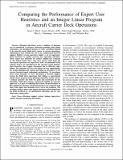| dc.contributor.author | Ryan, Jason C. | |
| dc.contributor.author | Banerjee, Ashis | |
| dc.contributor.author | Roy, Nicholas | |
| dc.contributor.author | Cummings, M. L. | |
| dc.date.accessioned | 2015-05-19T18:50:30Z | |
| dc.date.available | 2015-05-19T18:50:30Z | |
| dc.date.issued | 2014-05 | |
| dc.date.submitted | 2013-04 | |
| dc.identifier.issn | 2168-2267 | |
| dc.identifier.issn | 2168-2275 | |
| dc.identifier.uri | http://hdl.handle.net/1721.1/97036 | |
| dc.description.abstract | Planning operations across a number of domains can be considered as resource allocation problems with timing constraints. An unexplored instance of such a problem domain is the aircraft carrier flight deck, where, in current operations, replanning is done without the aid of any computerized decision support. Rather, veteran operators employ a set of experience-based heuristics to quickly generate new operating schedules. These expert user heuristics are neither codified nor evaluated by the United States Navy; they have grown solely from the convergent experiences of supervisory staff. As unmanned aerial vehicles (UAVs) are introduced in the aircraft carrier domain, these heuristics may require alterations due to differing capabilities. The inclusion of UAVs also allows for new opportunities for on-line planning and control, providing an alternative to the current heuristic-based replanning methodology. To investigate these issues formally, we have developed a decision support system for flight deck operations that utilizes a conventional integer linear program-based planning algorithm. In this system, a human operator sets both the goals and constraints for the algorithm, which then returns a proposed schedule for operator approval. As a part of validating this system, the performance of this collaborative human-automation planner was compared with that of the expert user heuristics over a set of test scenarios. The resulting analysis shows that human heuristics often outperform the plans produced by an optimization algorithm, but are also often more conservative. | en_US |
| dc.description.sponsorship | United States. Office of Naval Research (Autonomy Program Contract N000140910625) | en_US |
| dc.language.iso | en_US | |
| dc.publisher | Institute of Electrical and Electronics Engineers (IEEE) | en_US |
| dc.relation.isversionof | http://dx.doi.org/10.1109/TCYB.2013.2271694 | en_US |
| dc.rights | Creative Commons Attribution-Noncommercial-Share Alike | en_US |
| dc.rights.uri | http://creativecommons.org/licenses/by-nc-sa/4.0/ | en_US |
| dc.source | MIT web domain | en_US |
| dc.title | Comparing the Performance of Expert User Heuristics and an Integer Linear Program in Aircraft Carrier Deck Operations | en_US |
| dc.type | Article | en_US |
| dc.identifier.citation | Ryan, Jason C., Ashis Gopal Banerjee, Mary L. Cummings, and Nicholas Roy. “Comparing the Performance of Expert User Heuristics and an Integer Linear Program in Aircraft Carrier Deck Operations.” IEEE Transactions on Cybernetics 44, no. 6 (June 2014): 761–773. | en_US |
| dc.contributor.department | Massachusetts Institute of Technology. Computer Science and Artificial Intelligence Laboratory | en_US |
| dc.contributor.department | Massachusetts Institute of Technology. Department of Aeronautics and Astronautics | en_US |
| dc.contributor.mitauthor | Ryan, Jason C. | en_US |
| dc.contributor.mitauthor | Banerjee, Ashis | en_US |
| dc.contributor.mitauthor | Cummings, M. L. | en_US |
| dc.contributor.mitauthor | Roy, Nicholas | en_US |
| dc.relation.journal | IEEE Transactions on Cybernetics | en_US |
| dc.eprint.version | Author's final manuscript | en_US |
| dc.type.uri | http://purl.org/eprint/type/JournalArticle | en_US |
| eprint.status | http://purl.org/eprint/status/PeerReviewed | en_US |
| dspace.orderedauthors | Ryan, Jason C.; Banerjee, Ashis Gopal; Cummings, Mary L.; Roy, Nicholas | en_US |
| dc.identifier.orcid | https://orcid.org/0000-0002-8293-0492 | |
| mit.license | OPEN_ACCESS_POLICY | en_US |
| mit.metadata.status | Complete | |
